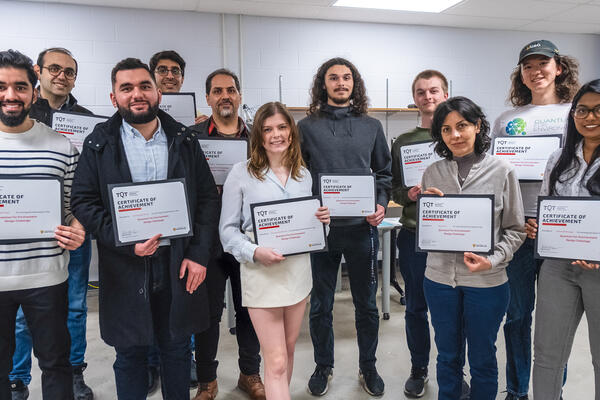
Waterloo physicist awarded prestigious Sloan Fellowship
The Alfred P. Sloan Foundation has recognized Waterloo professor, Dmitry Abanin, for his groundbreaking theoretical research in condensed matter physics of Dirac materials, such as graphene

The Alfred P. Sloan Foundation has recognized Waterloo professor, Dmitry Abanin, for his groundbreaking theoretical research in condensed matter physics of Dirac materials, such as graphene
By Media RelationsThe Alfred P. Sloan Foundation has recognized Waterloo professor, Dmitry Abanin, for his groundbreaking theoretical research in condensed matter physics of Dirac materials, such as graphene.
Thirty-two-year-old Abanin’s work has resulted in a number of significant theories related to graphene and other, so called, Dirac materials that exhibit potentially game-changing properties as conductors. He was named as a recipient of a Sloan Research Fellowship today.
“For a society to really grow, it needs people who are pushing the boundaries of what’s known to make new progress. Many of these ideas will enrich our understanding of the world, and some will really click and lead to something big,” said Abanin. “That’s why this kind of fellowship is important—it supports people who are probing the edges of knowledge. It will help me, my group, and our research go further.”
Graphene, a single layer of carbon, is a newer crystalline material that is no thicker than a single atom but stronger than a layer of steel at the same thickness. It has important applications for medicine, integrated circuits, solar cells and superconductors.
For the next decade, Abanin has mapped out an ambitious, field-leading research program that aims to develop a universal theory of phenomena in Dirac materials. Such a comprehensive theory is essential to the future development of nano-electronics and spintronics applications, which are expected to transform the future of technology.
“Several of Abanin’s theoretical predictions have been confirmed experimentally, which is a remarkable achievement for a physicist so early in his career,” said Terrance McMahon, dean of science at Waterloo. “We are very proud that Dmitry has been recognized for his transformational research and ideas.”
For more than a half-century, the prestigious Sloan Research Fellowships have been awarded annually to the rising stars of science in Canada and the United States, helping establish them as the next generation of scientific leaders in areas spanning physics, chemistry, biology, and related disciplines. Fellows receive $50,000 to further their research.
Abanin is a faculty member at the Perimeter Institute. He also holds an adjunct professorship in Physics and Astronomy at the University of Waterloo and is an associate faculty member of Waterloo’s Institute for Quantum Computing (IQC).
He joined Perimeter in 2013 following postdoctoral research positions at Harvard and Princeton. He has worked alongside Andre Geim and Konstantin Novoselov whose groundbreaking research on graphene was awarded the 2010 Nobel Prize in Physics.
Abanin is the twelfth Waterloo researcher to be awarded a Sloan Fellowship since the 1960s. Professor Matteo Mariantoni, also from the Department of Physics and Astronomy and IQC, won a Sloan Fellowship in 2013.

Read more
12 Waterloo students and postdoctoral fellows receive up to $10,000 in funding to develop their green-tech solutions

Read more
Dr. William Wong’s research aims to help improve sexually transmitted and blood-borne infections care

Read more
Waterloo announces winners of annual award for co-op students from each of the six faculties
The University of Waterloo acknowledges that much of our work takes place on the traditional territory of the Neutral, Anishinaabeg and Haudenosaunee peoples. Our main campus is situated on the Haldimand Tract, the land granted to the Six Nations that includes six miles on each side of the Grand River. Our active work toward reconciliation takes place across our campuses through research, learning, teaching, and community building, and is co-ordinated within the Office of Indigenous Relations.